Current News
/ArcaMax

Nick Reiner's schizophrenia meds made him 'erratic,' sources say
A new report says Nick Reiner has a diagnosis of schizophrenia and that his behavior became “erratic and dangerous” due to a medication change in the weeks before he allegedly killed his parents Rob and Michele Reiner at their home in Los Angeles' Brentwood neighborhood.
The 32-year-old, who is charged with two counts of first-degree murder...Read more
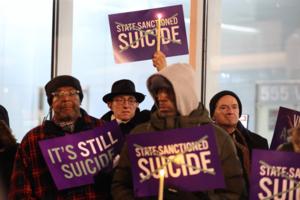
Some Illinois hospital systems won't participate in medical aid-in-dying, which is allowed under a new law
CHICAGO — Though a new Illinois law allows doctors to help terminally ill people end their lives, several Illinois health systems with religious affiliations say they will not participate.
OSF HealthCare, Ascension and Hospital Sisters Health System all say they will not take part in medical aid-in-dying.
The new law, which sparked ...Read more

Trump administration will not release full 'Epstein files' by deadline as Democrats call for probe
The congressionally mandated deadline for the federal government to disclose voluminous materials gathered on Jeffrey Epstein arrived Friday, with the Justice Department set to blow it — promising that while a batch was coming, it would take weeks to roll out the full array of documents.
In an interview on Fox News, Deputy Attorney General ...Read more
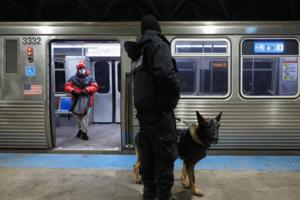
Trump administration threatens to withhold $50 million from Chicago Transit Authority, calling its plan to add police 'materially deficient'
CHICAGO — The Chicago Transit Authority’s plan to boost the number of police officers and K-9 guards on the city’s mass transit system is “materially deficient,” President Donald Trump’s administration said Friday as it threatened to cut the system off from up to $50 million in federal funding.
Trump’s Federal Transit ...Read more
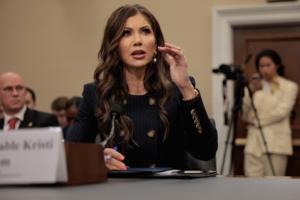
Trump pauses green-card lottery after Brown University shooting
Homeland Security Secretary Kristi Noem announced Friday that the Trump administration is pausing an immigrant green-card lottery program that granted the Brown University shooting suspect legal permission to enter the United States years ago.
“This heinous individual should never have been allowed in our country,” said Noem in a tweet. “...Read more
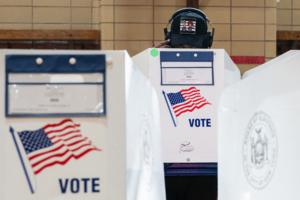
Trump's DOJ offers states confidential deal to remove voters flagged by feds
The U.S. Department of Justice has sent a confidential draft agreement to more than a dozen states that would require election officials to remove any alleged ineligible voters identified during a federal review of their voter rolls.
The agreement — called a memorandum of understanding, or MOU — would hand the federal government a major ...Read more

Judge in nursing home bankruptcy case gives families fresh hope of compensation for injuries, deaths
A bankruptcy judge blocked an attempt by a nursing home chain’s primary investor to shield himself from settlement payments and liability in lawsuits alleging hundreds of patient injuries and deaths, encouraging those pursuing millions in damages.
Genesis HealthCare, once the nation’s largest nursing home chain, filed for Chapter 11 ...Read more
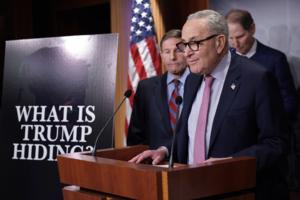
Justice Department faces deadline day on Epstein files law
WASHINGTON — The Justice Department faces a Friday deadline to release investigative materials on the late sex offender Jeffrey Epstein, an inflection point in a controversy with deep intrigue and potential political ramifications for President Donald Trump.
Congress overwhelmingly passed legislation last month that orders the Justice ...Read more

Inside the FDA's vaccine uproar
Six days after a senior FDA official sent a sweeping internal email claiming that COVID vaccines had caused the deaths of “at least 10 children,” 12 former FDA commissioners released an extraordinary warning in the Dec. 3 issue of the New England Journal of Medicine.
They wrote that the claims and policy changes in the memo from Vinay ...Read more
Miami-Dade deputies were asked to help find Brown University shooting suspect
MIAMI — The Miami-Dade Sheriff’s Office was asked to help find the man investigators say fatally shot two Brown University students last week and a Massachusetts Institute of Technology professor days later, the agency said.
Deputies went to a location that was provided to them through a tip earlier this week, but “the search did not ...Read more
Washington Gov. Ferguson proposes $1 billion to buy 3 new ferries
SEATTLE — Gov. Bob Ferguson wants to spend $1 billion to buy three new state ferries and an additional $150 million to help keep the oldest boats in Washington State Ferries' fleet on the water as long as possible before those new vessels arrive.
If the proposal is approved by legislators, the state would have six hybrid-electric boats in the...Read more
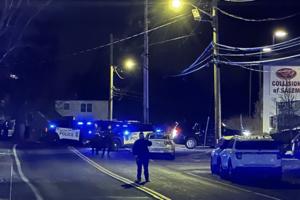
Brown University, MIT professor shooter identified as former student, found dead in New Hampshire
BOSTON — The suspected shooter who murdered two Brown University students on Saturday and an MIT physics professor on Monday has been found dead in a New Hampshire storage facility.
“Tonight our Providence neighbors can finally breathe a little easier,” Providence Mayor Brett Smiley said at a press conference at Brown University held ...Read more
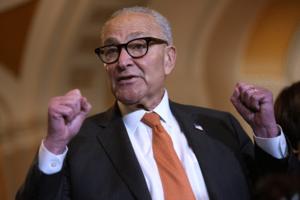
Schumer shrugs off 'toughest year' critique of Senate Democratic leadership
Sen. Chuck Schumer is shrugging off criticism that he’s endured his “toughest year” amid criticism of his leadership of the Senate Democratic caucus.
The Senate minority leader from Brooklyn said “it goes with the territory” to be a lightning rod for harsh attacks from various factions within his own party, not to mention President ...Read more

Kentucky school board rejects plan to close horse therapy program without new funding
LEXINGTON, Ky. — The Fayette County School Board on Thursday unanimously agreed to support and find alternative funding for The Stables beyond next school year, rejecting a recommendation to close the program after next school year if such founding was not found.
The decision bucked Superintendent Demetrus Liggins’ recommendation to either ...Read more

Ex-Minnesota funeral director decapitated body of woman whose skull was found in woods, charges say
MINNEAPOLIS — A former Minnesota funeral director has been charged with the post-death decapitation of a woman whose skull was found by Boy Scouts in western Wisconsin woods nearly a quarter-century ago.
Benjamin Carl Hanson, 57, of Bayport was charged Thursday in St. Croix County Circuit Court with two felonies — hiding a corpse and felony...Read more
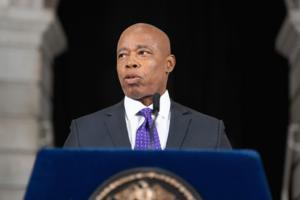
New York City Mayor Eric Adams' ex Jasmine Ray made $100,000 private salary while also earning 6 figures in City Hall job
NEW YORK — At the same time she held a full-time job in the Adams administration, Jasmine Ray, the mayor’s ex-girlfriend, was pulling in a $100,000 annual salary from a city-funded daycare center — even though a legal agreement held she was only supposed to spend 10 hours per week on the daycare gig, the Daily News has learned.
Ray ...Read more
Brown University freshman from Maryland recounts day of campus mass shooting
BALTIMORE — Teo Miranda-Moreno, a Brown University freshman and Mt. Hebron High School alum, was studying and stressing about final exams Saturday when gunfire broke out a short walk away on the Rhode Island campus.
Another mass shooting was underway — one that ultimately claimed the lives of two Brown students and injured nine others. ...Read more

Putin says he's ready to end war though rejects concessions
President Vladimir Putin said he’s willing to discuss bringing Russia’s war in Ukraine to an end, even as he ruled out changes sought by Kyiv and Europe to a U.S. peace plan drawn up with Moscow.
Putin said he had “practically agreed” on proposals for ending the war set out at summit talks with U.S. President Donald Trump in Alaska in ...Read more
Putin says Russia ready to end war even as he rejects compromise
President Vladimir Putin said he’s willing to discuss bringing Russia’s war in Ukraine to an end, even as he ruled out changes sought by Kyiv and Europe to a U.S. peace plan drawn up with Moscow.
Putin said he had “practically agreed” on proposals for ending the war set out at summit talks with U.S. President Donald Trump in Alaska in ...Read more
China points to risk of clash with US after Taiwan arms package
China reiterated that U.S. weapons sales to Taiwan raise the chances of a clash between the superpowers — underscoring its displeasure after Washington approved a deal worth up to $11 billion.
The military assistance served to “put the people in Taiwan on a powder keg, push the Taiwan Strait toward danger and inevitably increase the risk of...Read more
Popular Stories
- Commentary: Donald Trump wants a resurgence in European nationalism
- She was approved for a green card after 3 decades in the US. Then ICE arrested her
- Who's running the LAPD? Chief's style draws mixed reviews in first year
- Brown University shooter found dead in New Hampshire: reports
- California in for wet, white, potentially wild Christmas as Pineapple Express storm looms





